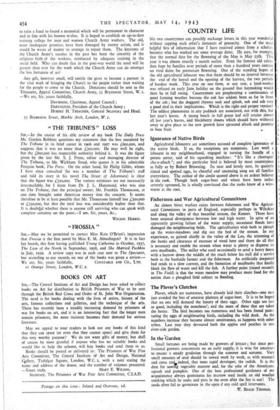COUNTRY LIFE
No two countrymen can possibly exchange letters in this year wonderful without capping each other's instances of precocity. One of the most helpful bits of information that I have received comes from a scholar- botanist who has worked out some average dates. He says, for exampi::, that the normal date for the flowering of the May is May 25th. This year it was almost exactly a month earlier. Even the famous old calen- dars kept by families over periods of more than a hundred years contain no rival dates for premature flowering. One of the standing hopes of the old agricultural labourer was that there should be an interval between the end of the haysel and the opening of the harvest, the two periods of hardest work. This year on one farm, at any rate, a land-worker was refused an early June holiday on the ground that haymaking would then be in full swing. Countrymen are prophesying a continuance of good farming weather because the oak has seldom been so far in front of the ash ; but the doggerel rhymes soak and splash, oak and ash vary a good deal in their implications. Which is the right and proper version? The oddest phenomena in any paddock are associated, not with this, but last year's leaves. A young beech in full green leaf still retains almost all last year's leaves, and blackberry shoots which should have withered away to give place to the new growth have sprouted afresh and promise to bear fruit.
Ignorance of Native Birds
Agricultural labourers are sometimes accused of complete ignorance of the native birds. If so, the exceptions are numerous. Last week a labourer in my neighbourhood, engaged in turning the handle of a potato sorter, said of his squeaking machine: " It's like a cherrapin' cha-a-afinch "; and this particular bird is beloved by most countrymen as fully as by Robert Browning. Its neat and lovely nest, its quaintly tinted and spotted eggs, its cheerful and unceasing song are all familiar everywhere. The author of the simile quoted above is an ardent believer in the rook. Though both sugar-beet and wheat have been rather severely uprooted, he is wholly convinced that the rooks knew of a wire- worm at the root.
Fishermen and War Agricultural Committees An almost bitter warfare exists between fishermen and War Agricul- tural Committees in parts of• England, especially perhaps in Wiltshire and along the valley of that beautiful stream, the Kennet. There have been unusual divergences between low and high water. In spite of an apparently growing failure of the water supply, occasional floods have damaged the neighbouring fields. The agriculturists wish both to plough up the water-meadows and dig out the bed of the stream. In my experience, as gained chiefly in the valley of the Lea, the trimming of the banks and clearance of excesses of weed here and there do all that is necessary and enable the stream when water is plenty to disperse its own mudbanks. The miller who used occasionally to send a heavy horse with a harrow down the middle of the reach below his mill did a service both to the bankside farmer and the fisherman. An artificially deepened bed tends to a slow current, and the formation of mudbanks that finally block the flow of water and kill the fish. A further point (raised recently in The Field) is that the water meadow may produce more food for the nation than a ploughed field subject to flooding.
The Plover's Clutches
Plover, which are numerous, have already laid their clutches—one nest just avoided the feet of amateur planters of sugar-beet. It is to be hoped that no one will demand the luxury of their eggs. Other eggs are just as good, including the moorhens'; and the more of these that are taken the better. The bird becomes too numerous and has been found punc- turing the eggs of neighbouring birds, including the wild duck. As the numbers increase they become almost omnivorous, as happens with other tribes. Last year they devoured both the apples and peaches in one river-side garden.
In the Garden Small fortunes are being made by growers of lettuce ; but since pro- fessional growers concentrate on an early supply, it is wise for amateurs to ensure a steady gradation through the summer and autumn. Very small amounts of seed should be sowed week by week, as with mustard and cress aniwindeed, that most rapid developer, the radish. It is the date for sowing vegetable marrow and, for the sake of the Americans. squash and pumpkin. One of the best professional gardeners of my acquaintance always germinates his marrow seed inside an old woollen stocking which he soaks and puts in the oven after the fire is out! The seeds often fail to germinate in the open if any cold spell intervenes.
W. BEACH THOMAS.


























 Previous page
Previous page